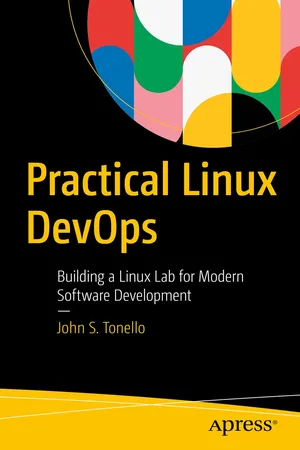
eBook - ePub
Practical Linux DevOps
Building a Linux Lab for Modern Software Development
- English
- ePUB (mobile friendly)
- Available on iOS & Android
eBook - ePub
About this book
Learn, develop and hone your Linux and DevOps skills by building a lab for learning, testing and exploring the latest Linux and open-source technologies. This book helps Linux users and others to master modern DevOps practices using a wide range of software and tools.
Having a home or work-based Linux lab is indispensable to anyone looking to experiment with the ever-evolving landscape of new software and DevOps. With open-source tools and readily available hardware, you will end up with a lab you can use to try virtually any modern software, including Chef, Docker, Kubernetes and stalwarts like DNS, Dovecot, and Postfix for email. You'll set up pipelines for software deployment and focus on discrete projects that help you learn through doing. In the end, you'll acquire the skills needed to become better informed, more marketable engineers and developers, and better able to take on a wide array of software projects with confidence.
Practical Linux DevOps is the perfect companion for those who want to learn how to build systems with utility and learn about modern hardware and software practices.
What You'll Learn
- Set up a Linux-based virtualization environment and workstation
- Create a lab network with a fully qualified domain
- Build web-based applications with NGINX and LAMP
- Use version-control tools like Git
- Automate deployments and configurations
- Think like a modern DevOps engineer
Who This Book Is For
New and modestly experienced users with basic understanding of a basic understanding of Windows or Linux command line, as well as
would-be and current DevOps engineers, and full-stack and other software developers
Tools to learn more effectively

Saving Books

Keyword Search

Annotating Text

Listen to it instead
Information
Table of contents
- Cover
- Front Matter
- 1. Gather Your Hardware
- 2. Setting Up a Virtual Environment
- 3. Set Up a DNS Server
- 4. Setting Up an Email Server
- 5. Building a LAMP Stack: Apache and PHP
- 6. Installing MariaDB and Creating a Simple Web Application
- 7. Web Server Alternatives
- 8. Containerizing and Automating Your Deployments
- 9. Server Management and Maintenance
- 10. Extend Your DevOps Capabilities with Git
- 11. Automate System Deployments with Terraform
- Back Matter
Frequently asked questions
Yes, you can cancel anytime from the Subscription tab in your account settings on the Perlego website. Your subscription will stay active until the end of your current billing period. Learn how to cancel your subscription
No, books cannot be downloaded as external files, such as PDFs, for use outside of Perlego. However, you can download books within the Perlego app for offline reading on mobile or tablet. Learn how to download books offline
Perlego offers two plans: Essential and Complete
- Essential is ideal for learners and professionals who enjoy exploring a wide range of subjects. Access the Essential Library with 800,000+ trusted titles and best-sellers across business, personal growth, and the humanities. Includes unlimited reading time and Standard Read Aloud voice.
- Complete: Perfect for advanced learners and researchers needing full, unrestricted access. Unlock 1.4M+ books across hundreds of subjects, including academic and specialized titles. The Complete Plan also includes advanced features like Premium Read Aloud and Research Assistant.
We are an online textbook subscription service, where you can get access to an entire online library for less than the price of a single book per month. With over 1 million books across 990+ topics, we’ve got you covered! Learn about our mission
Look out for the read-aloud symbol on your next book to see if you can listen to it. The read-aloud tool reads text aloud for you, highlighting the text as it is being read. You can pause it, speed it up and slow it down. Learn more about Read Aloud
Yes! You can use the Perlego app on both iOS and Android devices to read anytime, anywhere — even offline. Perfect for commutes or when you’re on the go.
Please note we cannot support devices running on iOS 13 and Android 7 or earlier. Learn more about using the app
Please note we cannot support devices running on iOS 13 and Android 7 or earlier. Learn more about using the app
Yes, you can access Practical Linux DevOps by John S. Tonello in PDF and/or ePUB format, as well as other popular books in Computer Science & Project Management. We have over one million books available in our catalogue for you to explore.